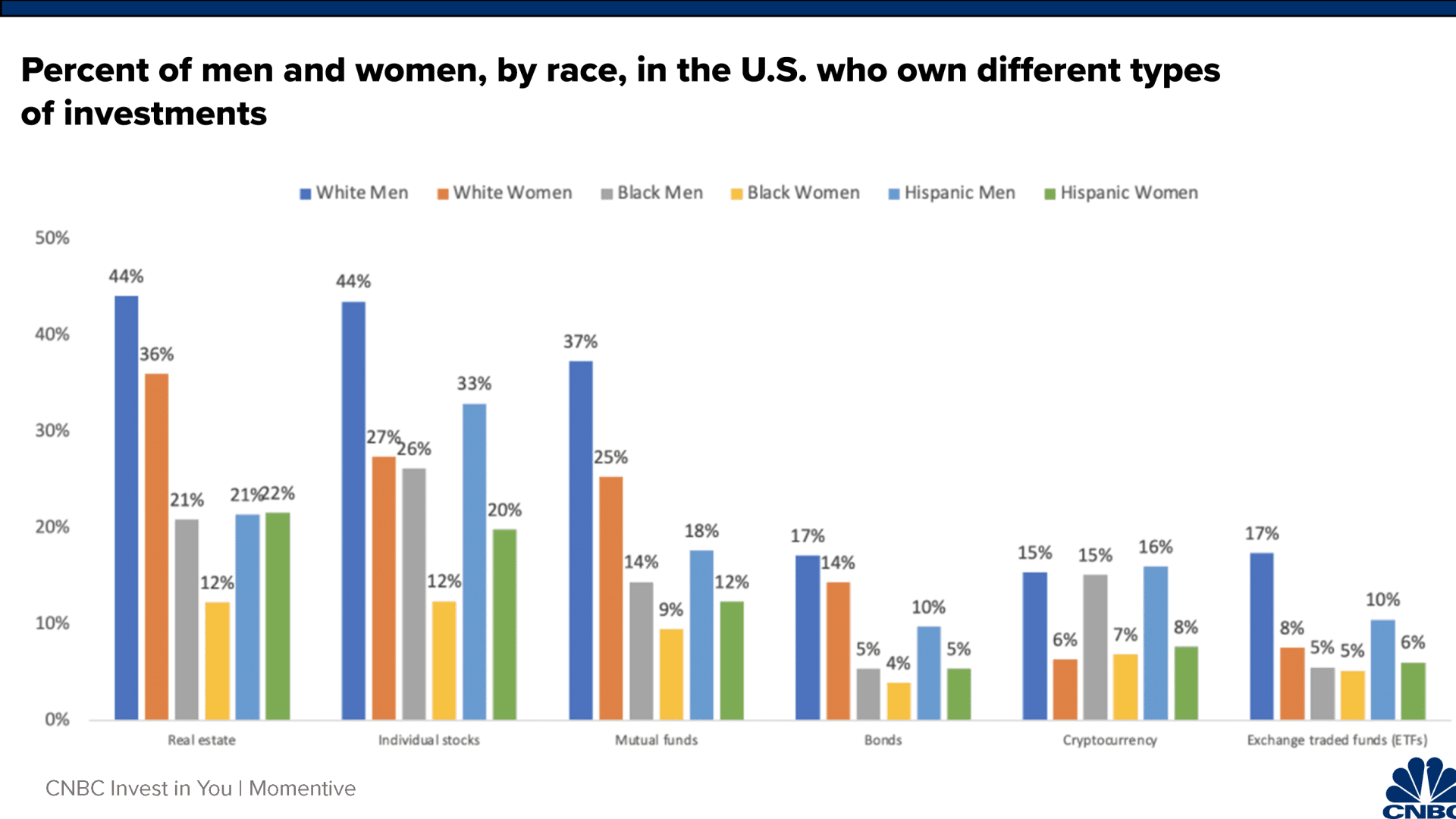
- Twice as many men as women invest in cryptocurrency, according to CNBC and Acorn's Invest in You: Next Gen Investor survey, conducted in partnership with Momentive.
- The crypto gender gap exceeds the existing gap within traditional investments including stocks, ETFs, mutual funds and real estate.
- Cryptocurrencies including bitcoin, ethereum, and dogecoin have been promoted as a way to democratize a traditionally walled-off finance field and increase investor diversity.
Cryptocurrency is a 21st century financial instrument with a very 20th century problem: not enough women. Twice as many men as women invest in cryptocurrency (16% of men vs. 7% of women), according to CNBC and Acorn's Invest in You: Next Gen Investor survey, conducted in partnership with Momentive.
Women are lagging behind men in their rates of cryptocurrency investing, just as they have historically struggled to keep pace with men in more traditional investment verticals. In fact, in the new survey data, the gender disparity in crypto matches or exceeds the gender gaps in ownership of exchange-traded funds (14% of men vs. 7% of women), individual stocks (40% of men vs. 24% of women), mutual funds (30% of men vs. 20% of women), real estate (36% of men vs. 30% of women), and bonds (14% of men vs. 11% of women).
Get Southern California news, weather forecasts and entertainment stories to your inbox. Sign up for NBC LA newsletters.
The survey was conducted for CNBC and Acorns by Momentive, the company formerly known as SurveyMonkey, from August 4-9, 2021, among more than 5,530 adults in the U.S., 2,980 of whom have investments in stocks, bonds, mutual funds, ETFs, or cryptocurrency.
'Democratizing' investing and gender
Gender disparities have dogged the financial services industry for decades, but cryptocurrencies like bitcoin, ethereum, and dogecoin have been promoted as a way to democratize a traditionally walled-off field, welcoming new and more diverse investors into the fold. Only about one in 10 people in the U.S. (11%) currently invest in cryptocurrencies, but so far the industry has not been able to make inroads among the key demographic group of women.
Money Report
That's especially confounding because in other significant ways, cryptocurrency is really living up to its hype in leveling the playing field. Crypto is the only financial vertical that has a higher participation rate among younger adults than older adults: 15% of those 18 to 34 years old own cryptocurrencies, compared with 11% of those ages 35 to 64 and 4% of those 65 and older.
Even more interesting is that people of all races are about equally likely to own cryptocurrency: 11% of whites, 11% of Blacks, 10% of Hispanics, 14% of Asians, and 13% of people of another race all have crypto investments. Even though cryptocurrency has broken down barriers in investing by race, it hasn't managed to do the same by gender.
Black women face the highest investing barriers
Personal investing, and the world of finance in general, is notorious for its historic exclusion of women and people of color. For decades, women could not take out a loan, sign a mortgage, or even own a credit card without having a male co-signer. People of color, too, faced discrimination and systemic barriers to investing.
The legacy of these discriminatory practices continues even through today. In the new survey results, Black women are about half as likely as Black men, one third as likely as white women, and one-fourth as likely as white men to own real estate. Similarly, just 51% of Black women say they have a traditional checking account, compared with 63% of Black men, 71% of white women and 78% of white men.

At the same time, Black women have by far the highest rates of student debt: 30% of Black women but just 17% of Black men, 16% of white women, and 13% of white men have student debt.
As a still-nascent industry, cryptocurrency is well-positioned to avoid many of the discriminatory pitfalls the traditional investing world has inculcated over the years. Today's would-be investors have more accessible resources — social media channels, online trainings, and targeted marketing — that can get them involved in new or more traditional forms of investing.
Demographics as financial destiny
Without access to these more traditional financial instruments, Black women may feel shut out of the investing world altogether. Women of all races are equally likely to say nobody ever taught them about investing (28% among all women), but Black and Hispanic women still have lower rates of investing relative to white women.

Even though people of color are investing in cryptocurrencies at higher rates than they are participating in other investment realms, whites still make up a majority of the crypto market. More than six in 10 cryptocurrency investors are white (62%), 67% are men, and 66% are under age 45.
That's a more diverse group compared with, for example, people who invest in mutual funds — 80% of whom are white, 58% of whom are male, and 75% of whom are 45 and older.
But when combining gender and race, cryptocurrency looks much the same as some of those more buttoned-up financial verticals: just 19% of cryptocurrency investors are white women, and only 4% are Black women. This lack of diversity among cryptocurrency investors means whole swaths of the public are missing the opportunity, and repeating the same story of the investment industry going back to the very start.
SIGN UP: Money 101 is an 8-week learning course to financial freedom, delivered weekly to your inbox.
CHECK OUT: When job interviewers ask 'What are your weaknesses?' they're testing 'your emotional intelligence' via Grow with Acorns+CNBC
Disclosure: NBCUniversal and Comcast Ventures are investors in Acorns.






